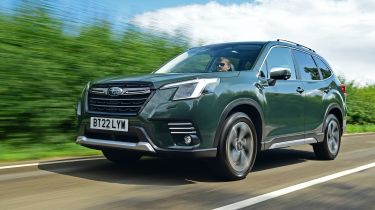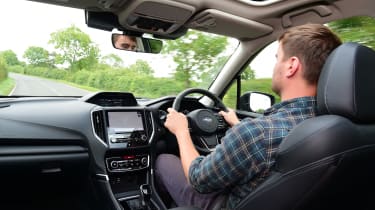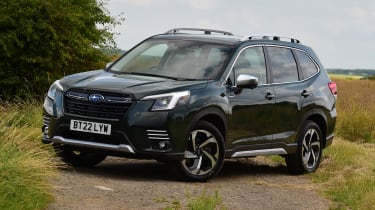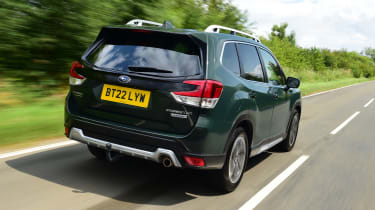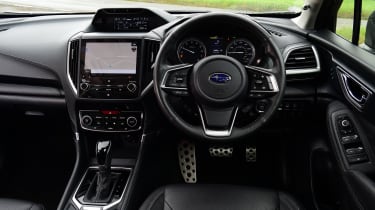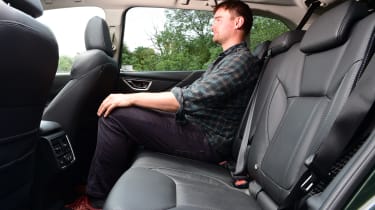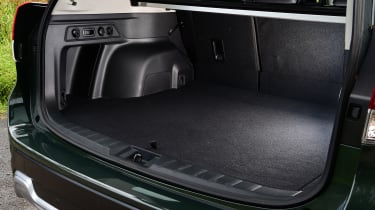Subaru Forester SUV review
"Thanks to its boxy looks, the Subaru Forester is tough, practical and reliable, but now gets a much improved interior"
Pros
- Good to drive
- Improved interior
- Sturdy build quality
Cons
- Pricey to run
- Lacks some features
- Conservative styling
Verdict - Is the Subaru Forester a good car?
The Subaru Forester is a tough SUV with standard four-wheel drive that's known for its solid build quality and dependability. And while its boxy looks might not have changed much, the latest model now shares its underpinnings with the Subaru Impreza and XV – promising improved road manners, lower running costs and more interior space. A recent facelift has also improved the Forester’s interior technology to help it compete in a tough corner of the market.
Subaru Forester models, specs and alternatives
Forester spotters will need to be on top form, because an upright and angular nose, new rear lights and a black strip across the tailgate are about the extent of its new design cues. Even for its mid-life facelift, Subaru only introduced the subtlest of tweaks to its grille, front fog lights and paint palette. The latest generation is also slightly longer and wider, so there's plentiful knee room inside and its maximum luggage capacity (1,779 litres) beats the rival Toyota RAV4.
The best medium size SUV you can buy
Its interior is a vast improvement over the outgoing model, and while it's still not up to Audi Q3 standards, it now has more showroom appeal. Some of the latest features like digital instruments are missing, but the infotainment display has Apple CarPlay and Android Auto compatibility if you prefer your phone’s interface over Subaru’s own interface.
The big news under the bonnet is the adoption of Subaru's first mild-hybrid petrol engine, badged e-Boxer, which is claimed to give better fuel economy than the old turbocharged petrol engine. Even with this slight gain, the Forester is still one of the thirstiest medium-sized SUVs, but loyal Subaru owners should appreciate a step in the right direction. Its small battery and 16bhp electric motor recovers energy under deceleration from braking and coasting and then deploys it to assist the petrol engine as you accelerate.
More reviews
The new underpinnings introduced in 2019 have also tidied up the Forester's handling, and it now feels lighter on its feet and more responsive. For a model that looks a lot like a raised estate, it's also remarkably capable off-road.
The Forester e-Boxer scored the maximum five-star safety rating, thanks in part to the Subaru EyeSight suite of safety kit that uses windscreen-mounted cameras to detect hazards when driving. Subaru also performed very well in our 2023 Driver Power ownership satisfaction survey, coming fourth out of 32 manufacturers, with owners putting its interiors, practicality and boot space above all other brands.
MPG, running costs & CO2
Subaru has turned its back on diesel and has chosen mild-hybrid petrol engines as its future, at least for its combustion-engined models – it also offers the all-electric Subaru Solterra if you want to make the switch to an EV. Stick with the mild-hybrid Forester and you get an electrified version of the old 2.0-litre petrol engine, now dubbed 'e-Boxer', This comes paired with a CVT automatic gearbox that Subaru refers to as Lineartronic.
Subaru says the new mild-hybrid system ushered in an efficiency gain of around 10%. Fuel economy stands at 34.7mpg – so most rivals are still more economical – but CO2 emissions of 154g/km aren’t too bad for an SUV this size. Unlike a plug-in hybrid, you'll never need to connect the Subaru Forester e-Boxster to a charger, but because it only recoups a small amount of energy it also can't travel on electricity alone for very long – covering only short distances of around one mile at low speeds in traffic or while manoeuvring.
Instead, the electric motor is designed to take some strain off the combustion engine to help save fuel, while offering improved responsiveness and greater refinement. It also means the petrol engine can cut out more readily in traffic, and that it restarts unobtrusively.
Engines, drive & performance
While it might be a high-riding SUV, the Forester sits on the same underpinnings as the Subaru Impreza, and feels better to drive than the old model as a result. It's not a complete transformation, though, because there’s still plenty of body lean in corners, and the nose can be felt squatting and rising as you brake and accelerate. It certainly feels less fun from behind the wheel than a Ford Kuga or Mazda CX-5. Its upright shape and large windows provide superb visibility, but also introduce a fair amount of wind noise at higher speeds.
Its CVT automatic gearbox is smooth around town and, if you don't like its 'elastic band' feel on country roads, the steering-wheel paddles mimic the fixed ratios of a more traditional automatic. Its performance figures aren't particularly impressive, though, with 0-62mph taking 11.8 seconds and a top speed of 117mph trailing most rivals, especially considering its £35,000-plus price tag. We found the combination of this lack of power and the CVT gearbox meant we needed to strain the engine more than we’d like, to maintain a decent pace.
It hasn't moved away from its rugged roots either, shining off-road, where it has good ground clearance and shrugs off tricky terrain. We found the hybrid setup could sometimes hesitate when faced with tougher uphill slopes, but descents were taken care of using hill-descent control. There are different settings for snow/dirt and snow/mud that alters how the Forester behaves at low speeds, and this technology coupled with Subaru’s four-wheel drive setup, means this is one of the most capable family SUVs shy of a Land Rover Defender.
Interior & comfort
While Subarus are renowned for being extremely robust, this has usually gone hand-in-hand with workmanlike interior design. The Japanese manufacturer is evolving, however, and the Forester's interior is now a much nicer place to sit. In fact, while we still think its interior looks a touch dated next to rivals, Subaru owners ranked the brand’s interiors in first place in our latest Driver Power survey.
It's still a fairly conventional design compared with something like a Hyundai Tucson or Peugeot 3008, however, with analogue instruments, a centrally located infotainment screen in the dashboard and conventional dials sitting beneath it for the climate control. An additional display atop the dashboard provides additional information about the vehicle status, but the result is a slight lack of design cohesion. It took a few days to get familiar with the different groups of buttons on the steering wheel, and the odd decision to place the switches for the lane keep assist and forward collision technology on an overhead panel. At least the lane keep driving aid stays switched off once deactivated, should you prefer not to use it – collision avoidance resets each time you start the car for obvious safety reasons.
The main display can run Android Auto and Apple CarPlay, so even where standard sat-nav isn't fitted, you can still use their mapping apps to find your destination – provided there’s a strong enough mobile signal. The eight-inch screen is at least rather responsive, even if its graphics aren’t especially appealing to look at. On our test car, we found the standard-fit keyless entry somewhat temperamental, often only letting us in after a few tries.
There are only three levels to pick from: XE, Sport and XE Premium. Plump for the XE and you’ll still get plenty of standard equipment, including automatic LED headlights, heated front seats, keyless entry, DAB radio and adaptive cruise control. Sport brings a heated steering wheel, contrasting stitching, power-folding door mirrors, privacy glass, 18-inch alloy wheels, coloured exterior accents and navigation.
XE Premium adds extras including a sunroof, leather upholstery and a powered tailgate. Subaru doesn’t offer many options; besides dealer-fit accessories, you’re limited to the choice of paint colour.
Practicality & boot space
While it might look very similar to before, the latest Forester is longer and wider, with improved interior space. Knee room and shoulder room are especially generous, while headroom should be adequate for all but the tallest occupants. Customers certainly reported space is plentiful, with practicality and boot space scores that put it fifth out of the top 75 models included in our Driver Power survey.
Subaru has sped up the operation of the powered tailgate fitted to the top XE Premium version, which will be welcome in rain-soaked Britain, and once open it reveals a big boot. The Forester's boxy shape means there's 1,779 litres of cargo space with the back seats folded down, beating the 1,690 litres offered by the Toyota RAV4. With the rear seats in place, you’ll have 509 litres to fill.
Reliability & safety
After a hiatus lasting several years, Subaru performed very well in our 2023 Driver Power owner satisfaction survey, coming fourth out of 32 makers, despite 35% of Subaru owners telling us they experienced a fault in the first year. This suggests the majority of problems are only minor hiccups, and that Subaru was able to keep customers happy with a fix. The Forester itself came 29th out of the 75 models included, with a 57th spot for reliability. Owners were even more impressed with its interior (fourth place), practicality and boot space (fifth) and ride and handling, where it came eighth.
Independent safety experts Euro NCAP crash-tested the Forester, where it scored a full five-star safety rating. It scored 97% for adult occupant protection as well as 91% for the child occupant category, 80% for pedestrians and 78% in safety assist results.
Euro NCAP commented that the standard-fit autonomous emergency braking (AEB) system performed well in tests and the Forester avoided collisions in all test scenarios. The system known as Subaru EyeSight Driver Assist technology scans the road ahead to identify hazards (including vehicles, pedestrians and cyclists) and lane markings, and activates autonomous emergency braking if necessary. The Forester will also detect driver fatigue or distraction and can even apply the brakes while reversing if an imminent collision is anticipated.
